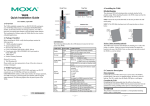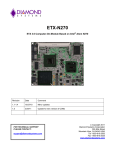Download AVT 200HD Tuner • Setup Guide
Transcript
Product Category
AVT 200HD Tuner • Setup Guide
The Extron AVT 200HD is a high performance tuner that receives ATSC over-the-air broadcast signals and delivers highdefinition television (HDTV) video simultaneously on HDMI®, RGBHV, and YUV outputs. It outputs pulse code modulation
(PCM) stereo or Dolby® Digital surround (AC-3) formatted audio signals with simultaneous S/PDIF digital and analog
balanced and unbalanced stereo. The AVT 200HD also provides clear QAM (unencrypted) cable (CATV) decoding and
standard definition video outputs. Additional integrator and user-friendly features include a multi-function on-screen
display and channel presets.
This guide provides instructions for an experienced installer to install and connect the AVT 200HD tuner.
NOTE:
For full installation, configuration, and operation details, see the AVT 200HD User Guide, available at
www.extron.com.
Rear Panel Features and Connections
2
1
100-240V
3
0.8A
O
U
T
P
U
T
R
G
B
HDMI
YC
H
V
B-Y
Y
6
7
A
U
D
I
O
R-Y
VID
50/60 Hz
a
b
c
d
e
f
g
5
4
O
U
T
8
10
11
AIR/CABLE
RS-232/IR
9
12 13 14
DIGITAL AUDIO
L
COAX
L
R
R
AC power connector
Video outputs: composite video and S-video
RGBHV video output
Component (HD YUV) video output
HDMI video output
Audio output, analog RCA
Audio output, analog captive screw
OPTICAL
LAN
RF IN
h
i
j
k
l
m
n
Tx Rx
RESET
IR +12V
Coax: digital audio output, RCA coaxial
Optical: digital audio output, fiber optic
RF In air and cable input
RS-232/IR connector
LAN port
Reset button
Reset LED
Installation Steps
1.
Disconnect power from the tuner and turn off all other devices
that will be connected to it.
2.
(Optional) Mount the unit in a rack. Rack mount the tuner using
the supplied brackets (see the illustration at right).
3.
Connect the RF input. Connect an antenna or a CATV cable to
the RF In F-type connector (j on the rear panel diagram above) for
over-the-air or cable radio frequency input.
4.
Connect the video output. Connect an output device to one of
the following video output connectors:
zz
VID — Connect a composite video device to this BNC
connector (b, top). Supports 480i resolution.
zz
YC — Connect an S-video device to this mini-DIN
connector (b, bottom). Supports 480i resolution.
zz
RGBHV — Connect an RGBHV output device to these
BNC connectors (c), shown at right. This output
supports 480i, 480p, 720p, and 1080i resolutions.
zz
Component video — Connect an HD YUV output
device to these BNC connectors (d), shown at right.
This output supports 480i, 480p, 720p, and 1080i
resolutions.
Rack Mount
Bracket
VID
YC
R
G
H
V
RGBHV Connectors
R-Y
B
B-Y
Y
Component Video Connectors
1
AVT 200HD Tuner • Setup Guide (Continued)
zz
HDMI — Connect an HDMI output device to this HDMI connector (e on the rear panel diagram on the previous
page) for digital video output. Supports 480p, 720p, and 1080i resolutions. See the table below for pin assignments.
Pin
Signal
Pin
Signal
Pin
19
Signal
1 TMDS data 2+
7
TMDS data 0+
2 TMDS data 2 shield
8
TMDS data 0 shield 14 Reserved (NC on device)
3
TMDS data 2–
9
TMDS data 0–
4
TMDS data 1+
5
TMDS data 1 shield 11 TMDS clock shield
6
TMDS data 1–
10 TMDS clock+
12 TMDS clock–
13 CEC
15 SCL
18
2
HDMI
Type A Receptacle
1
16 SDA
18 +5 V power
2
18
HDMI
Type A Plug
Connect the audio output. Connect a speaker set, amplifier, receiver, or other audio output device to one or more of
the following connectors:
Tip (+)
zz
zz
RCA — Connect an audio output device to these RCA connectors (f) for unbalanced
analog audio output as shown at right.
Captive screw — Connect an audio output device to this 5-pole captive screw
connector (g on the rear panel diagram) for balanced or unbalanced analog audio as
shown below:
CAUTION:
zz
For unbalanced audio, connect the sleeves to ground.
DO NOT connect the sleeves to negative (–) contacts.
COAX
Coax — Connect a digital audio output device to this coaxial RCA jack (h) for S/PDIF signal transmission.
Optical — Connect a digital audio output device to this TOSLINK™ fiber optic connector (i) for S/PDIF
signal transmission.
OPTICAL
Connect control devices. Connect a computer or control system to one of these AVT ports to remotely
configure and control the tuner via the Windows®-based software, SIS™ commands, or the embedded web pages.
zz
zz
zz
7.
Do not tin the wires!
Unbalanced Audio Output
Balanced Audio Output
zz
R
R
Tip
NO Ground Here
Sleeve
Tip
NO Ground Here
Sleeve ( )
L
L
Tip
Ring
Sleeve
Tip
Ring
6.
19
17 DDC/CEC ground
19 Hot plug detect
5.
1
RS232 port — For serial RS-232 control, connect a host computer or control system to the Tx, Rx, and _ (ground)
pins of this 5-pin captive screw connector (k). The default protocol for this port is 9600 baud, 1 stop bit, no parity,
8 data bits, and no flow control.
LAN Ethernet port — Connect the AVT to an Ethernet LAN or WAN via this RJ-45 connector (l) to control the
tuner via computer using an Internet browser.
Config port — Connect a USB cable (USB A to mini B) between the computer and this USB port (b on the front
panel diagram on page 3) to use the Windows-based control software or SIS commands, or to upload firmware.
Apply power to the AVT by connecting a standard IEC power cord (provided) from a 100 to 240 VAC, 50-60 Hz power
source to the AC power receptacle (a).
Locking the Front Panel (Executive Mode)
To prevent accidental changes to settings, you can lock the AVT front panel or IR controls by placing the tuner in lock
(executive) mode. While the AVT is in lock mode, RS-232, USB, Ethernet, and IR communication remain available.
• Lock mode 1 locks all front panel functions. IR, RS-232, and Ethernet control are available.
• Lock mode 2 locks all front panel functions except volume control. IR, RS-232, and Ethernet control are available.
• Lock mode 3 locks out all IR access. RS-232, Ethernet, and the front panel controls are available.
2
1.
Press and hold the Menu and Next buttons simultaneously until Exec Mode Select appears in the LCD window
(approximately 3 seconds).
2.
Rotate either Adjustment knob until the desired mode name (Disable, Complete, Volume Only, or IR Lockout) is
displayed in the LCD window.
To exit lock mode, press and hold the Menu and Next buttons until Exec Mode Select is displayed in the LCD window,
then rotate either Adjustment knob until DISABLE is displayed.
Product Category
Front Panel Features
1
2
3
5
4
6
7
8
9
10
ADJUST
VOLUME
AVT 200HD
CHANNEL
IR
SDTV
EDTV
HDTV
CONFIG
MENU
ATSC TUNER
NEXT
a IR receiver — Receives commands via infrared signals from the optional AVT 200HD IR Remote Control. By default, the
IR sensor is enabled.
b Config port — Connect a USB cable (USB A to mini B) between your computer and this port to configure and control
the AVT via SIS commands or the Windows-based control software, and to update the firmware.
c LED display — This 5-digit, alphanumeric LED display indicates the over-the-air TV or CATV channel that is being
received (in Tune mode) or the selected channel preset (in Preset mode).
d TV format indicator LEDs — Light to indicate the digital television format of the input signal. Supported resolutions
include SDTV (480i), EDTV (480p), and HDTV (720p and 1080i). When no TV signals are detected, none of the LEDs light.
e Up (>) and Down (<) buttons — Change the channel or preset, depending on the selected operating mode. Each
press increments or decrements the number in the LED display (c).
zz
In Tune mode (default): The buttons select channel numbers to switch to channels that have been saved.
zz
In Preset mode: The buttons select the preset numbers to switch to channels that have been saved as presets.
Pressing and holding a button causes the displayed numbers to cycle up or down rapidly. When you release the button,
the displayed channel or preset is selected.
f LCD window — Displays messages, menu information, and your menu selections
g Menu button — Press this button to access the AVT 200HD menu system and step through the menus.
h Next button — Within a menu, press this button to step through the submenus.
i Adjustment knobs — Within a submenu, turn these horizontal and vertical Adjustment knobs to select options from
the submenu, such as the output resolution or the RF source (Air or Cable).
Default
Cycle
j Volume knob — Turn this knob to change the output volume from 0% (muted) to
Menu
100%. This knob adjusts volume for analog and PCM digital output only. It does not
affect Dolby surround digital (AC-3) volume.
CHANNEL
SETUP
Configuring the AVT 200HD Using the Front Panel
Menu
Menu selections are displayed on the front panel LCD screen (see the menu flow diagram
at right). To use any menu, press the Menu button repeatedly until the desired menu is
displayed on the LCD screen. Press the Next button repeatedly until the desired submenu is
displayed. Rotate the appropriate Adjustment knob to select an item from the submenu. To
exit a submenu and return to the main menu, press the Menu button at any time.
1.
From the Output Configuration menu, press Next until the Tuner Mode submenu is
displayed.
b. Rotate either Adjustment knob to select Tune.
2.
Select the radio frequency (RF) source:
a.
Press the Menu button once to display the Channel Setup menu, then press the Next
button once to display the RF Source submenu.
b. Rotate either Adjustment knob to select a source: Air, Cable Standard, Cable HRC, or
Cable IRC.
3.
OUTPUT
CONFIGURATION
30 sec.
Menu
AUDIO
CONFIGURATION
Place the AVT in tune mode:
a.
30 sec.
Menu
30 sec.
Menu
VIEW
COMM SETTING
30 sec.
Menu
UNIT
RESET
30 sec.
Menu
Scan for channels:
a.
From the Channel Setup menu, press Next until the LCD window displays Press Up
button to start scan.
>
b. Press the Up ( ) button on the front panel to start the scan.
PRESS NEXT
TO EXIT
30 sec.
Next
3
4.
From the Output Configuration submenus, use the Adjustment knobs to select the output resolution, the display type
(4X3 or 16X9), and the display mode (Fill, Follow, or Zoom).
5.
If needed, use the Audio Configuration submenus to select the digital audio type and the language for a second audio
program (SAP).
6.
Configure the comm port settings (serial port baud rate, IP addresses, and DHCP mode):
a.
From any View Comm Setting menu screen, press and hold the Next button, then press and hold the Up (>) and
Down (<) buttons simultaneously. Hold all three buttons until the Edit Comm Setting menu appears (2 seconds).
[) to move the blinking or angle
brackets to the parameter to be changed, then rotate the vertical Adjustment knob ({) to select a value.
b. On the Edit Comm Setting submenus, rotate the horizontal Adjustment knob (
7.
Press the Up or Down arrow button to select a channel.
8.
Turn the Volume knob to adjust the volume.
9.
If desired, use the Closed Caption submenu of the Output Configuration menu to turn closed captioning on or off.
10. Use SIS commands, the Windows-based control software, or the embedded web pages to mute or unmute the audio or
video, configure the closed caption display, and set up the V-chip program blocking as desired.
Simple Instruction Set (SIS) Commands
When setting up the AVT 200HD, you can issue SIS commands from your computer via RS-232 or a LAN connection as an
alternative to the front panel controls. See the AVT 200HD Series User Guide for a complete list of available SIS commands.
Command
ASCII command
(Host to Scaler)
Response
(Scaler to Host)
Select TV standard
E X$ TVST }
Tvst X$ ]
Begin channel scan
Tvsc1 ]
Stop channel scan
View tune mode channel list
E 1TVSC }
E 0TVSC }
E TVCH }
Set the TV format X$ for the incoming RF
signal. For X$:
0 = over-the air, 1 = cable standard
2 = cable HRC, 3 = cable IRC
Start scanning for available channels.
Tvsc0 ]
Stop scanning for channels.
View all presets
E TVPR }
P01 • T X!.X@ • Nname]...P99 • T X!.X@ • Nname ] ]
View a list of all saved presets.
Select tune mode
E 0TVTM }
E 1TVTM }
X! * X@T }
Tvtm0 ]
Place the tuner in tune mode.
Tvtm1 ]
Place the tuner in preset mode.
TvctX!.X@ ]
X2% T
TvprR X2%*X!.X@ ]
Save a specific channel as a
preset
Set output resolution and rate
E S X!*X@*X2% TVPR }
TvprS X2%*X!.X@ ]
Select channel X!.X@. X! = major number;
X@ = minor number.
Select preset X2% (which tunes to channel
X!.X@).
Save channel X!.X@ to preset X2%.
E X2^ RATE }
RateX2^ ]
Select CC service
E C X& TVCC }
TvccCX& ]
Enable or disable V-chip for TV
ETX3@*X1) VCHP }
VchpTX1) ]
Additional Description
T X!.X@ ] T X!.X@ ]...] ]
View a list of channels not hidden.
Select preset mode
Select channel by number
(in tune mode)
Select channel by preset
(in preset mode)
Extron USA - West
Headquarters
Extron USA - East
Extron Europe
Extron Asia
Extron Japan
Extron China
Extron Middle East
+800.633.9876
+800.633.9876
+800.3987.6673
+800.7339.8766
Inside Asia Only
+81.3.3511.7655
+81.3.3511.7656 FAX
+400.883.1568
Inside Europe Only
+971.4.2991800
+971.4.2991880 FAX
+1.919.863.1794
+1.919.863.1797 FAX
+31.33.453.4040
+31.33.453.4050 FAX
+65.6383.4400
+65.6383.4664 FAX
Inside USA/Canada Only
+1.714.491.1500
+1.714.491.1517 FAX
4
Select output resolution X2^. For X2^:
0 = 480i @ 59.54 Hz, 1 = 480p @ 59.94 Hz,
2 = 720p @ 60 Hz, 3 = 1080i @ 60 Hz.
Select closed captioning service X&.
For X&: 0 = closed captioning off,
1-6 = closed captioning services 1-6.
Enable or disable the V-chip for blocking
TV shows. For X1): 0 = off, 1 = on.
X3@ = Current V-chip access PIN number
(default is 0000).
Inside USA/Canada Only
Inside China Only
+86.21.3760.1568
+86.21.3760.1566 FAX
© 2011 Extron Electronics. All rights reserved. www.extron.com
68-1834-50
Rev. A 05 11








![Corel Office Document [PFP#241512617]](http://vs1.manualzilla.com/store/data/005699212_1-655f6a875c479857ca50d39f97eeaf8f-150x150.png)




